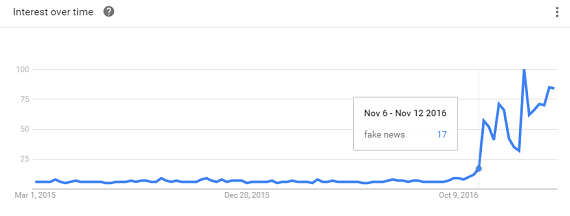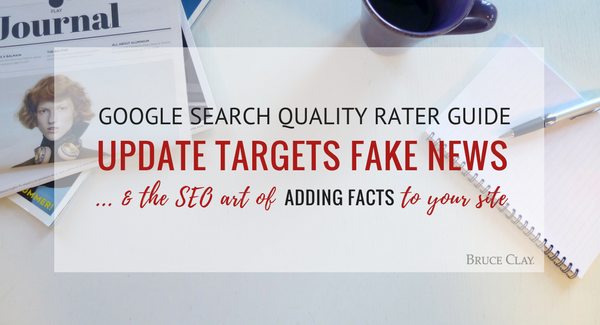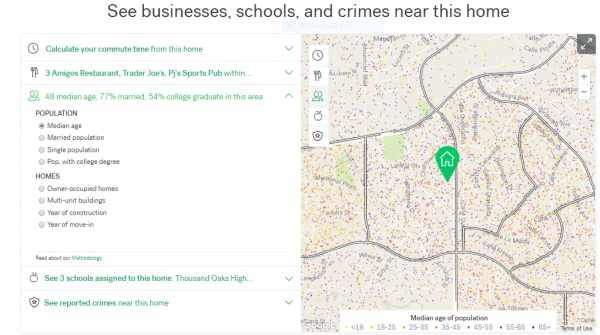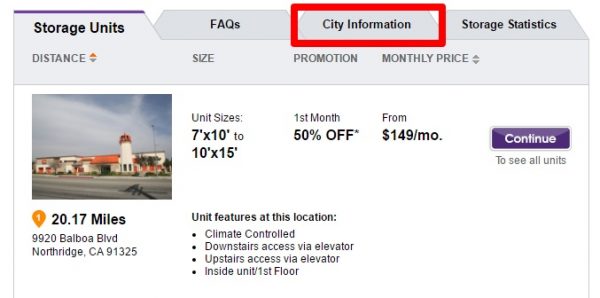How Fake News Changed SEO & How to Add More Facts to Your Site was originally published on BruceClay.com, home of expert search engine optimization tips.
The concept of “fake news” exploded into the public zeitgeist at the end of the 2016 presidential election season. It’s been in the spotlight ever since.

The popularity of the term “fake news” as indicated by Google search volume over the last two years skyrocketed the week of Nov. 6, 2016, the week of the U.S. presidential election.
Google is among those concerned with fake news, as we learn from this December 2016 interview with Google CEO Sundar Pichai.
Pichai says:
At Google, we’ve always cared about bringing the most relevant and accurate results to users … There have been a couple of instances where (fake news has) been pointed out, and we clearly did not get it right … Just in the last two days we announced that we will remove advertising from anything we identify as fake news.
Pichai’s focus here is towards paid advertisements but with all the buzz over fake news in the media, SEOs are asking questions about the affect of fake news on organic search.
The bottom line is that Google needs to provide users with quality answers that accurately fulfill the intent of their users’ queries.
So, why should SEOs care? What can you do? These are questions organic search marketers are wondering.

Is fake news beyond Google’s ability to control? You can bet the search engines don’t take that approach. Google and Bing are able to verify the accuracy of content, to some extent. And the search engines are already in a good position to mitigate the spread of fake news in organic search results.
Read on for what we know about:
- How Google is looking to algorithmically promote factually accurate content in search results
- How Google is training its computer programs to find and weed out fake news via a fresh update to its human quality rater guidelines.
- Plus how to integrate trustworthy factual information into your content using database-driven data.
Algorithmic Solution to Factual Accuracy in Search Results: Google’s Database of Facts
Two years ago the SEO community saw the first sign of prominent Googlers arguing for the usage of factual evidence instead of backlinks as the primary way of measuring domain authority.
New Scientist summed up the idea in an article titled “Google wants to rank websites based on facts not links.” The article summarized a lengthy research paper outlining a potential change to the way Google would rank sites organically.
For many SEOs, the paper implied that if a web page appropriately mentioned accurate factual evidence, it could contribute to its trustworthiness and thus boost organic rankings. This makes sense, especially since everyone knows content is king.
Additionally, the paper’s argument is in line with a patent that Google filed a decade prior about how to extract and catalog factual evidence from “unstructured documents and build an oracle for various domains” (emphasis ours).
From these documents we can posit that:
- Google has a large repository of factual evidence that they have been building for years and can reference as necessary.
- Google is very interested in measuring the factual accuracy of sites so it can be certain users are served the correct answer to any question.
If Google and other search engines place such a high value on accurate facts, it is imperative that SEOs be aware of how publishing fact vs. fiction could affect them.
Furthermore, there’s some evidence that Google is working toward taking action algorithmically to reduce the visibility of sites that publish fake news…
Update of the Search Quality Rater Guidelines
While Google has said nothing officially about penalizing a site for inaccurate facts, we’re seeing signs that factual information is important in their eyes.
Just last week, Google published an update to its Search Rater Quality Guidelines. In summarizing what’s changed, Jennifer Slegg suggested that algorithmic action is the intended goal of the guidelines that help human quality raters identify fake news pages on the web.
“(Google engineer Paul) Haahr said that they needed to make these specific changes to the guidelines in order to have training data from the raters. And the need for training data would mean they are looking for ways to algorithmically detect and downrank sites that fall into the categories of fake news, hate sites or other sites with dubious and unbacked theories or claims.”
Steps You Can Take To Avoid Being Labeled ‘Fake News’
Being perceived as authoritative in the eyes of the search engines is not easy. Here’s what you have to do to pass Google’s factual accuracy check:
- Use trusted sources whenever possible.
- Fact check when reviewing content. Look for verification of anything passed off as factual on your pages.
- Avoid sharing information with your users that could be false.
And here’s another pro tip. Where possible, integrate trustworthy factual information into your content using database-driven data.
Here’s this tip in action. Real estate sites are especially interested in offering users information about a given geographic area. The aim is to help people learn more about the area of a home, which in turn promotes conversions.
For example, here’s a screenshot of a portion of a property listing page on Trulia.com:

Local municipal data provided by third-party sources on a property listing page of Trulia.com.
The local data that Trulia publishes on a property listing page are area demographics, nearby businesses, schools and crime statistics. These stats are taken from third-party databases. The inclusion of these publicly available statistics is advantageous because Google sees these facts and weighs them as valuable information that helps a visitor with the intent of learning more about the property in question.
Thus, by adding this information to the rest of the content on the page, Trulia (and other real estate sites that do the same) have better fulfilled the intent of the query by being a one-stop-information-shop for users.
Similarly Public Storage, another well known brand, includes public data on some pages to either improve the user experience or better fulfill the intent of the query.
Below is a screenshot of a storage facility city page that include a “City Information” tab with indexable content about the region:

City data provided by third-party sources on a storage facility city page on PublicStorage.com.
Again, the inclusion of this information alone does not make Public Storage the best site but it does improve the user experience while simultaneously fulfilling the intent of the query in a more enriched and meaningful way.
In summary, if relevant database options like this are available in your industry or associated verticals, appropriately integrate them your content in order to:
- Better fulfill query intent
- Improve UX
- Add to the accurate factual information your pages feature
- Set your site apart from your competition as a one-stop-shop for searchers
- Make your content verifiably accurate
If you are interested in looking for data sources that might work with your site’s content, you might start with Google Public Data, Data.gov or Qliq. There’s a nice round up of more databases you can mine over here.
In a world of fake news where facts will be verified, set your pages apart by supporting your content with accurate information.
Quick Caveat about Database-Driven Content
Using facts as a method for measuring authority is not the be all, end all of ranking factors.
In 2015, Google’s Gary Illyes and Bing’s Duane Forrester spoke against building a site off of public data alone.
Obviously, the search engines will have seen or know about any public data you are referencing so, trying to out rank an existing authority is not the best strategy.
Also, the search engines will still consider other factors so, offering only data does not automatically make you the best. As we saw above with Trulia and Public Storage, you need more than just data and facts. A web page with 100 facts, should not expect to outrank a competing page with the same facts, original content, and a stellar UX.
Will Google Take Action to Suppress Fake News?
By updating the Search Quality Rater Guidelines to reflect a concern with identifying fake news, Google has shown they are not about to let undeserving pages slip through to Page 1 rankings.
It is not yet 100% clear whether Google will take algorithmic action against fake news or factually inaccurate content, or if their action will remain manual. But from all that we have seen, Google has the means to eventually implement an automated process that suppresses sites with inaccurate factual information in organic results. This makes sense since the search engine already goes to great lengths to feature accurate information and this would merely be a continuation of their existing efforts.
No comments:
Post a Comment